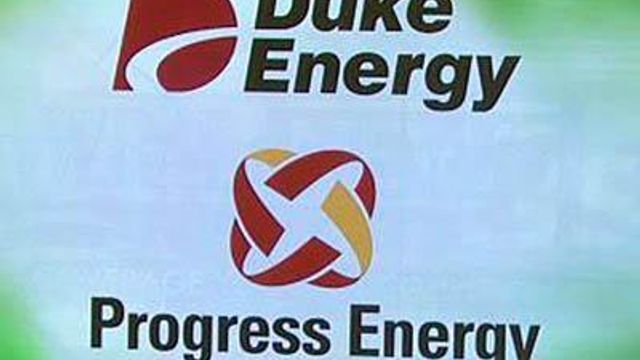Ex-Progress CEO: Duke had 'buyer's remorse' over merger
Duke Energy Corp. wanted so badly to get out of its planned merger with Progress Energy Inc. that Duke executives looked at various ways to scotch the deal in recent months, Progress' former chief executive said Thursday.
Posted — UpdatedUltimately, Bill Johnson told the North Carolina Utilities Commission, he paid the price for successfully steering the merger to completion.
"They wanted the merger. Then, they didn't want it," Johnson said. "They couldn't get out of it, and they didn't want to be stuck with me as the person who dragged them to it."
Immediately after the merger was completed July 2, the new utility's board of directors ousted Johnson from his roles as president and CEO of the combined company, claiming his management style didn't fit the firm.
Johnson's more than four hours of testimony Thursday were his first public statements about his unexpected departure from the nation's largest electric utility. His severance agreement, through which he stands to earn up to $45 million, prevents him from disparaging the firm, but it allows him to testify in official proceedings.
The Utilities Commission approved the merger on June 29, and Chairman Ed Finley said Thursday that the agency made its decision under the belief that Johnson would be in charge of the company, which had been the plan for 18 months.
Commissioners have said that they feel misled by Duke officials, who they learned had held internal discussions for weeks about removing Johnson but never told the agency that such a move was possible. Under state law, the commission has the power to rescind or alter its approval.
Jim Rogers, who served as Duke's president and CEO before the merger and was tapped to replace Johnson after the ouster, told the Utilities Commission last week that Duke's board of directors had misgivings about Johnson's ability to lead the company since at least mid-May and that Johnson had to be aware of their feelings.
"If there was a signal, I missed it," Johnson told the commission.
He said he looked forward to the July 2 merger – his wife even bought him a new tie for the occasion – and had what he called an exceptional meeting with the management team of the new company in Charlotte before an afternoon board meeting.
"I'm elected CEO. (There were) handshakes, pats on the back, congratulations all around. Two hours later, I'm gone," he said. "This was a special day. It ended in a way that was a surprise."
Duke board member Marie McKee, who served on Progress' board before the merger and voted against Johnson's ouster, said she was stunned by his removal.
"I didn't know whether to cry or throw up," she said when the motion was made to replace him.
Ann Maynard Gray was the only previous Duke director to speak during the meeting, and she never wavered as the former Progress directors on the new board pleaded to salvage Johnson's position, McKee said.
"She never elaborated further that he was not a good fit – for an hour," she said.
"We were listened to but not heard," said Jim Hyler, another former Progress director who joined the new Duke board. "Clearly, the decision had been made."
McKee said she wasn't sure if Progress would have approved the merger had they known Johnson's fate ahead of time. She also isn't certain whether she will remain on Duke's board.
Hyler said the deal is still a good one for shareholders and will benefit Progress in the long run. Still, he said, he is keeping his options open as to whether to stay on the Duke board.
Three top Progress executives turned in their resignations after Johnson's departure – John McArthur, executive vice president of regulated utilities; Mark Mulhern, executive vice president and chief administrative officer; and Paula Sims, chief integration and innovation officer.
Johnson choked up at one point in his testimony when he asked to take a minute to bid farewell to his former Progress colleagues.
"I exited quickly, and I didn't have a chance to say goodbye to a lot of people," he said, wiping away tears.
Duke dragged heels on deal
The merger was initially announced in January 2011 and was expected to close by the end of that year, but the Federal Energy Regulatory Commission put the deal on hold late last year, asking for the companies to make concessions to competing utilities in the Carolinas.
During the subsequent delay, Johnson said, he sensed a growing desperation from Duke's executives and managers to run away from the deal.
Rogers talked with him about restructuring the merger and about ways to meet FERC's demands that Johnson said would clearly delay the deal past a July 8 deadline. After that date, either company could walk away from the merger without penalty.
"The activities they were taking, the behaviors in the negotiations with the regulatory staff, to me, was a pretty clear signal they had buyer's remorse," Johnson said.
Duke officials even wanted to "backtrack" on a promise to deliver $650 million in savings to customers by trying to include the $110 million cost of meeting FERC's demands in the total, Johnson said, adding that he balked at that idea.
"The idea that we would come back to the Public Staff and this commission and re-trade the $650 million in savings to customers was a point of great personal friction to me," he said.
The relationship between Johnson and Rogers deteriorated – Johnson said he was infuriated with an interview Rogers gave in which he implied that Johnson accepted a smaller price for Progress shareholders in the merger in exchange for the CEO job – and tensions rose between the Progress and Duke management teams during this period, he said.
Progress went so far as to hire a New York law firm to ensure the deal was completed, he said.
"To us, the most important thing was getting this thing done," he said, noting that Progress faced the prospect of massive layoffs, cuts to employee benefits and delaying capital spending if the merger failed.
"(The merger) is really good for everybody if it works out right, and I hope it does," he said.
In the spring, Johnson said, Rogers and other Duke executives began talking down the merger on Wall Street, suggesting to stock analysts that it would be better for Duke financially and the company's stock price if the deal didn't go through.
"It was like dropping an atomic bomb on the deal," Johnson said of subsequent analyst reports that urged investors to sell Progress stock and informed people of ways that Duke could scotch the merger.
Leadership style not autocratic
Gray dropped her own bomb on Johnson after that July 2 board meeting, telling him that she wanted his resignation by the following morning.
"Your leadership style was very successful at Progress, but it's not right for the new Duke," he recalled her as saying.
Gray gave no other reason for the board's decision, he said, adding that he told her he thought the move would make it difficult to integrate the eastern Carolinas – Progress' historic base – into the combined company.
"I don't quibble with their authority to do this," he said. "There was no appeal here."
"Maybe, maybe not," Finley responded.
Johnson angrily disputed Duke's characterization of his management style. Rogers last week said Johnson was an autocrat and didn't accept other opinions.
"I'm not autocratic. I'm adamant about several things," a seething Johnson said, listing a priority on safety and managing with honesty and integrity. "If you're in the nuclear (power) business, you can't afford to be close-minded."
Most people he's worked with enjoyed the relationship, he said, and his management style has never been criticized in employment reviews.
"I would say, with no hubris at all, that I had outstanding performance reviews," he said.
McKee and Hyler both praised Johnson's leadership abilities and his honest character in their testimony to the Utilities Commission.
"He was a man we were all proud to work with, that others were proud to work for," McKee said.
"He's very committed to running business the right kind of way," Hyler said. "He doesn't dominate people, but he's a strong leader."
Johnson also noted that Duke's board had no opportunity to watch him in action as a manager because both Duke and Progress had "put our pencils down" last December on trying to integrate the companies' operations after FERC expressed concerns about the combination. The following six months were spent on obtaining all regulatory approvals, he said.
Culture clash noted
In his testimony before the Utilities Commission last week, Rogers also cited other reasons Duke was concerned about Johnson's leadership ability, including problems at Progress' nuclear plants. The Crystal River plant in Florida, for example, has been out of commission since 2009, and the estimated cost to repair damage there is about $2.5 billion.
Johnson said Crystal River's problems are well-documented, and Duke officials had to have known of them before they proposed the merger in July 2010. Also, he said, some Duke nuclear plants have had their own operational problems.
Progress' recent weak financial performance, which Rogers also mentioned last week, was common among utilities after the mild winter, Johnson said, although the Raleigh-based company also had expenses linked to some nuclear plant outages.
Finally, Rogers said, the Duke board realized late into the process that the corporate cultures of Duke and Progress were so far apart that a strong leader was needed to pull them together.
"None of those concerns were expressed to me," Johnson said. "It seems odd to me that, if these issues were such burning issues, I never heard about them."
He did note that, when he met with the Duke board in June 2011, he was advised that he "wasn't hired to turn Duke into Progress." Instead, he was told, he needed to fold Progress into Duke.
McKee and Hyler echoed Johnson in saying that no one ever spoke to Progress board members about any concerns they had about Johnson's ability to lead the company after the merger or any of the other Duke board worries that Rogers cited.
Gray and Michael Browning, who also was on the Duke board before the merger and remains on the board, are expected to appear before the Utilities Commission on Friday.
North Carolina Attorney General Roy Cooper has launched a separate investigation into the merger, demanding copies of communication between Duke board members and executives.
• Credits
Copyright 2024 by Capitol Broadcasting Company. All rights reserved. This material may not be published, broadcast, rewritten or redistributed.






